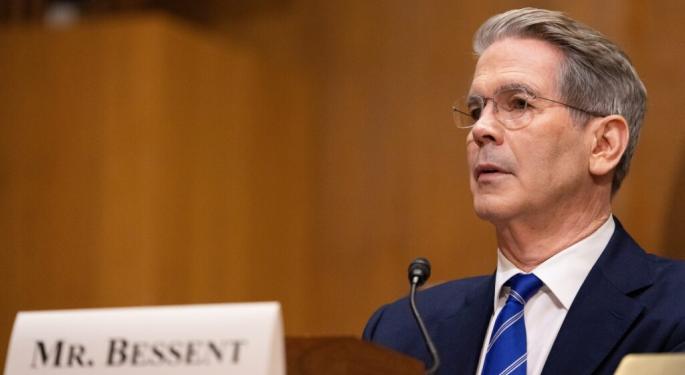Scott Bessant Eyes 'Big, Beautiful Rebalancing' With China — Says Beijing Must Shift Toward Consumption, Teases 'Very Interesting' Purchase Agreements
U.S. Treasury Secretary Scott Bessent says that the United States and China are entering a more constructive phase in trade talks, with the possibility of a broader realignment in their economic relationship.
What Happened: “I think we’re in a very good place with China now and we can start moving on to bigger discussions,” Bessent said, speaking to Bloomberg Television on Wednesday.
“You know, as I’ve said many times, there is the potential for a big, beautiful rebalancing between the US and China,” he said, describing the current situation in China as “highly imbalanced,” referring to China accounting for 30% of global manufacturing, which according to Bessent, is “not sustainable.”
See Also: Nvidia’s CEO Hits Beijing Like A Rockstar, Stirs Jensen-Mania In China
Bessent says, “We believe they should become more of a consumption economy,” while emphasizing President Donald Trump’s commitment to bringing “precision manufacturing back to the U.S.”
According to Bessent, talks with the Chinese will revive the use of purchasing agreements between the two countries, particularly in agriculture.
“We will be talking about a purchasing agreement, especially AG,” he said, referencing Trump's prior trade deal with Beijing. “[The] Chinese lived up to the purchase agreements during President Trump’s final year in office, and then the Biden administration didn’t enforce those purchase agreements,” he says.
He further added, “We’re going to let bygones be bygones. We’re going to look forward. And I think we can come up with some very interesting purchasing agreements.”
Why It Matters: Over a month ago, it was reported that the Chinese government was working on an updated version of its “Made in China 2025” plan, with a focus on semiconductors and electric vehicles.
The plan also leans against American efforts to divert the Chinese economy towards consumption, with the nation’s Premier Xi Jinping saying, “We must keep strengthening the manufacturing sector, adhere to the principles of self-reliance and self-improvement, and master key core technologies,” during a factory visit in May.
Recently, central bankers and finance ministers of the G7 Nations expressed similar concerns, and have pledged to tackle "excessive imbalances" in global trade practices.
While China wasn’t mentioned directly, the joint statement issued and the language used indicated a position against state-driven economic policies typically linked with Beijing.
Read More:
Photo courtesy: Maxim Elramsisy / Shutterstock.com
© 2025 Benzinga.com. Benzinga does not provide investment advice. All rights reserved.
Posted-In: Politics



